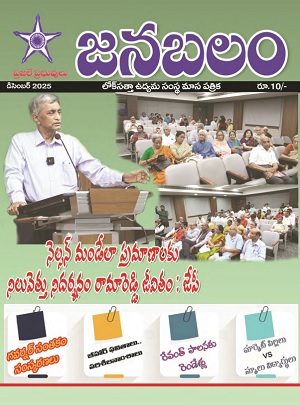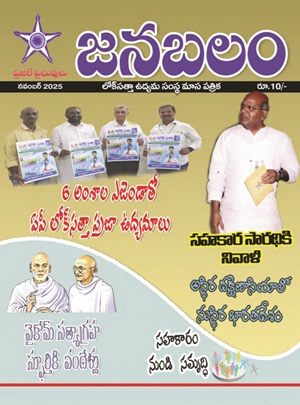Lok Satta Party President Dr. Jayaprakash Narayan today demanded that the proposed Lok Pal Bill also provide for the appointment of a Lokayukta in each State and an ombudsman in each district of the country.
In a letter to Prime Minister Dr. Manmohan Singh and leaders of all parties, Dr. JP said that Parliament can now make a law to tackle corruption all over the country with the Government of India ratifying the United Nations Convention against Corruption (UNCAC). Article 253 automatically empowers Parliament to make laws for the whole nation in order to implement any international treaty, agreement or convention. He recalled that in 2005 Parliament had adopted the Bill on right to information applicable to all States and local authorities.
In his letter, Dr. JP said, “The problem of corruption is not limited to the Union Government. By common admission, corruption is as widespread in our States and local governments. That some States are less than eager to have such a law cannot be a sound argument for Parliament not creating anti-corruption institutions in States.”
If the Lokpal law is not made applicable to states, it will be a great betrayal of the trust of the people, and unacceptable abdication of responsibilities by the Union government. “In all the debate on Lokpal, we are missing the wood for the trees”, Dr JP said.
Addressing media, Dr. JP said that the official draft Lokpal Bill contained many provisions which make the Lokpal a robust, effective and independent anti-corruption institution. He, however, drew the Prime Minister’s attention to the recommendations made by a Round Table of eminent citizens conducted in New Delhi on April 24, 2011.
The Round Table unanimously recommended that a single, effective legislation should be made by Parliament applicable for the entire country. It should provide for a Lokpal for the Union, Lokayukta for States, and Ombudsmen for local governments, with each institution having identical functions and powers within their respective jurisdictions.
The Lokpal Round Table recommended that the three members of the Central Vigilance Commission be made ex-officio members of the Lokpal to facilitate effective coordination and integration with existing institutions. The CVC has jurisdiction over all public servants and vigilance wings of various departments and agencies.
Dr. JP said that the draft Bill on Lokpal rightly excludes the Prime Minister from the purview of the Lokpal. Since the Prime Minister occupies a pivotal position in our parliamentary democracy, many authorities have recommended that the Prime Minister be accountable only to Parliament and not to any extra-parliamentary institution to protect the stability of the country and preserve the authority of Parliament.
The Lokpal Round Table recommended that Chief Ministers should be brought under the jurisdiction of Lokpal at the national level to preserve their stature and ensure probity and integrity in State Governments.
It also recommended that the anti-corruption wings of the CBI and ACBs be brought under Lokpal’s protective umbrella to ensure independent and impartial crime investigation. This is in the context of the widespread belief that the professionalism and efficacy of the CBI and ACBs are compromised by undue interference in their investigations. The anti-corruption wing of the CBI should be separated and brought under the broad supervision of the Lokpal and the Anti Corruption Bureaus (ACBs) in states under the supervision of Lokayuktas.
Dr. JP listed the following as among salutary provisions in the official draft Lokpal Bill:
- Appointment of the Lokpal by a collegium, and the provision for a search committee if necessary
- Removal of Lokpal only on the recommendation of the Supreme Court
- Power to the Lokpal to appoint Director of Prosecutions and guide the prosecution process
- Charging the Lokpal expenditure to the Consolidated Fund of India
- Power to the Lokpal to investigate even allegations pending before any court or committee
- Power to the Lokpal to constitute benches
- Making any sanction or permission unnecessary for the Lokpal to investigate
- Powers to the Lokpal to file a case in a special court
- Constitution of special courts as recommended by the Lokpal.
- Provisions for attachment of properties and confiscation on conviction of the guilty





No comments:
Post a Comment